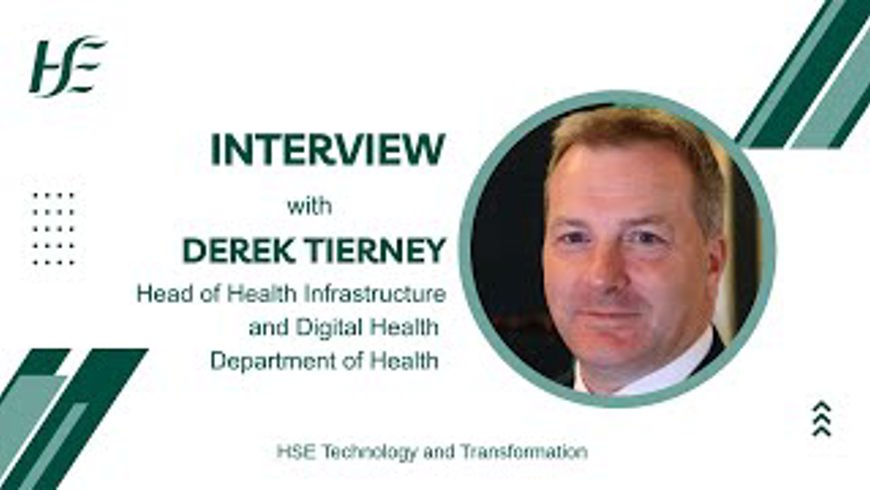
Driving Digital for Care: Reflections on Ireland’s Digital Health Future
By Derek Tierney, Head of Health Infrastructure and Digital Health, Department of Health
As part of the Transforming Healthcare – People Behind the Progress interview series, I recently sat down with Joyce Shaw from HSE Technology and Transformation to discuss my role, the ambitions behind the Digital for Care 2030 Strategy, and Ireland’s evolving place in European digital health. What follows is a reflection on that conversation and a look at the vision, challenges, and priorities that are shaping Ireland’s digital health journey today.
Intro:
I’ve always believed in the power of public service to deliver real, lasting change. During the COVID-19 pandemic, I had the opportunity to lead the rollout of the national vaccination programme and what struck me most was how digital tools enabled such a complex, fast-moving response. From managing vaccination records to engaging the public across digital channels, I saw firsthand how technology could support health at scale.
That experience led me to my current role in the Department of Health, where I now lead the health infrastructure and digital health agenda. Our focus today is not just about technology, it’s about reforming the health service in a way that puts patients first, reduces the burden on staff, and builds a future-ready system for everyone.
Transforming Health Through Digital
When we talk about transformation in digital health, we’re not just talking about better systems. We’re talking about a fundamental shift in how care is delivered from paper-based and siloed to integrated, data-driven, and person-centred. That’s the aim of the Digital for Care 2030 Strategy.
Our strategy outlines a clear, unified vision: to move from fragmented systems to connected models of care. It supports the goals of Sláintecare by shifting the focus from hospitals to community and home-based care, enabled by telehealth, virtual services, and digital tools.
We’ve already made significant progress. The HSE Health App is now live and expanding, giving people access to their own health records and appointment scheduling. Our Shared Care Record programme is underway, and we’ve initiated procurement for ePrescribing, which will replace handwritten prescriptions and modernise medication management. We’re also rolling out new office software to support staff, trialling AI in clinical pathways, and preparing for a national Electronic Health Record.
Addressing Today’s Challenges
The strategy targets the real challenges our health service faces:
- Legacy systems that make data-sharing difficult
- Clinical staff spending up to 30% of their time on admin
- Increasing hospital demand
- A need for stronger governance and data security
- The risk of digital exclusion, especially for vulnerable groups
By introducing digital triage, virtual care, and automation, we can reduce pressure on hospitals, improve care coordination, and free up time for clinicians to focus on patients. But we are also careful to take an inclusive approach. Hybrid models, accessible design, and clear communication help ensure that digital transformation doesn’t leave anyone behind.
Collaboration at the Core
Digital for Care has been co-designed between the Department of Health and the HSE, and that collaboration is essential. People don’t see two separate organisations they see one health service. That’s why we’ve built this strategy on six shared principles that guide everything we do:
- The patient as an empowered partner
- Digitally enabled workforce and workplace
- Connected care
- Data-driven decision-making
- Innovation and ecosystem growth
- Secure foundations and digital enablers
We speak with one voice on digital health and that clarity of purpose is helping to align teams, engage stakeholders, and build trust across the system.
Connecting with Europe
Ireland’s digital health future is also tied closely to the European landscape. We are aligning with the goals of the European Health Data Space, which will enable safe, secure data sharing across borders and support innovation, research, and public health.
Standards and interoperability are at the heart of this. We’re working to ensure that data can flow seamlessly between systems, care settings, and jurisdictions all while maintaining robust protections for privacy and cybersecurity. Programmes like MyHealth@MyHands will give people greater control over their health information, supporting transparency and empowerment in a European context.
What’s Next
What excites me most is the shift toward integrated, patient-centred care where clinicians and service providers are supported by technology, not burdened by it. The HSE Health App, Shared Care Record, and future national EHR are all steps toward a more accessible, equitable health service that works for everyone, regardless of where they live or the complexity of their needs.
This transformation won’t happen overnight, but we are on the right path. Our job now is to stay focused, keep listening, and continue to build digital solutions that work for people both inside and outside the health system.
A Shared Vision
To everyone working across health and social care: thank you. Your commitment is what will bring this strategy to life. If we continue working together guided by shared principles and a shared vision we can deliver safe, seamless and connected care for all.
